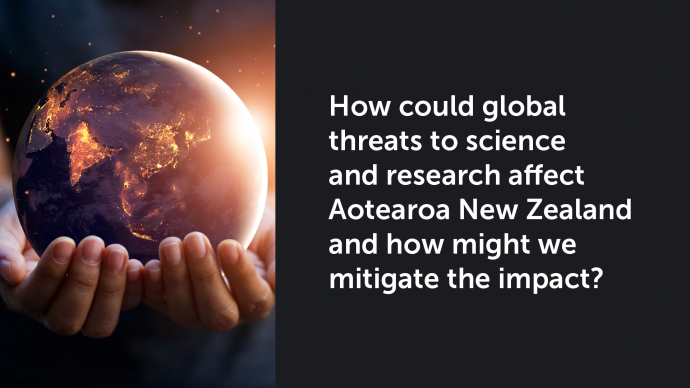Expert perspective: Michael Ahie

Michael Ahie, a leader with broad experience across the public and private sectors, reframes the challenges as an opportunity:
"Dramatic funding cuts and restrictions on research in the USA will have consequences for Aotearoa New Zealand – including loss of significant grants – but they will only exacerbate an existing crisis. As the Science Sector Advisory Group identified, decades of underfunding have hollowed out our research ecosystem, including our universities. Paradoxically, the global threats to science and research represent an opportunity for us to confront our chronic under-investment.
New Zealand’s research investment is 1.54% of GDP (with Government contributing 0.57%). Compare this with countries like Israel (5.6% of GDP), South Korea (4.8%), and Denmark (3.4%), and the OECD average of 2.7%. Among OECD countries, we rank at the bottom of the table alongside countries like Lithuania, Latvia, and Bulgaria.
We should ask ourselves this question: why are the small advanced economies we admire and wish to emulate spending double what we spend on R&D?
New Zealand is at a tipping point. We have a naive 1990s mindset: expecting businesses to drive innovation without accompanying national commitments. If we increased Government spending to 1% of GDP, global evidence suggests that private investment would likely double. The gains could be accelerated by facilitating technology transfer between universities, research institutes, and industry.
Targeted investment in research would uphold our competitive advantage where we have traditionally had success, and also has the potential to stimulate new areas where we have a decent chance of succeeding. We need four categories of research: to generate commercial returns, to inform policy, to advance knowledge, and to guide stewardship of our environment. We must champion all four, and advocate for the government to invest at least 1% of GDP in research.
We need to appeal to values that resonate with all New Zealanders: national pride in our competitive standing, protection of our unique heritage and taonga, economic returns, and broader social benefits. We should prioritise New Zealand’s research strengths, such as agriculture, earth sciences, indigenous studies, and health. As my Koro said, "A wise chief puts one waka out to the tide, not all of them." That’s what the small advanced economies do – they make strategic choices. We must strategically protect world-leading research that is currently vulnerable to funding cuts, such as the study of indigenous knowledge, where we are world leading and the world looks to us for inspiration. We must also support top researchers to expand and diversify their international collaborations, to leverage our capacity, and to attract talent and foreign capital.
As prestigious US universities fold like garden chairs, American citizens are realising what they could lose and are speaking out. I’m hopeful that this dialogue could trigger conversations here that catalyse a reset of our approach to science and research."
Published May 2025
 Michael Ahie is a member of the Science System Advisory Group, and previously of the Government Panel that reviewed Crown Research Institutes. He has been the Chancellor of Massey University, and has chaired He Waka Eke Noa, Plant & Food Research, and the Kiwifruit Breeding Centre. He is currently Chair of New Zealand’s Plants Market Access Council and a Director of Zespri Group.
Michael Ahie is a member of the Science System Advisory Group, and previously of the Government Panel that reviewed Crown Research Institutes. He has been the Chancellor of Massey University, and has chaired He Waka Eke Noa, Plant & Food Research, and the Kiwifruit Breeding Centre. He is currently Chair of New Zealand’s Plants Market Access Council and a Director of Zespri Group.

